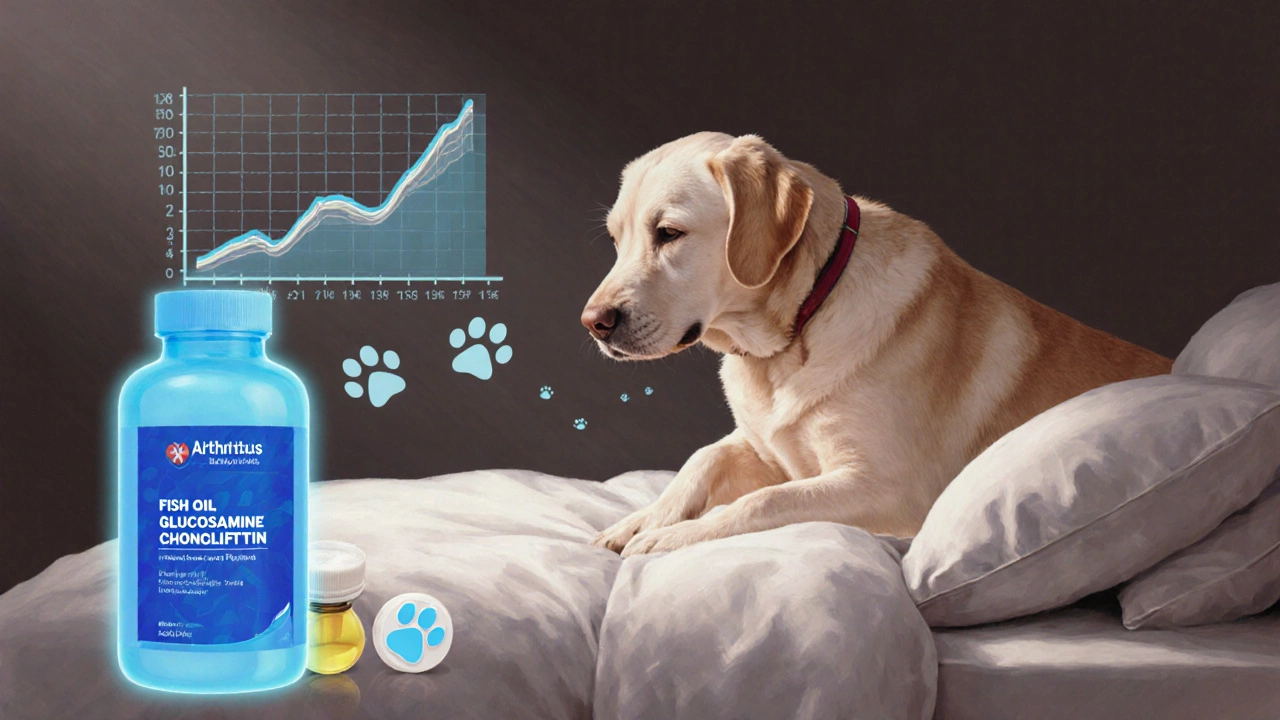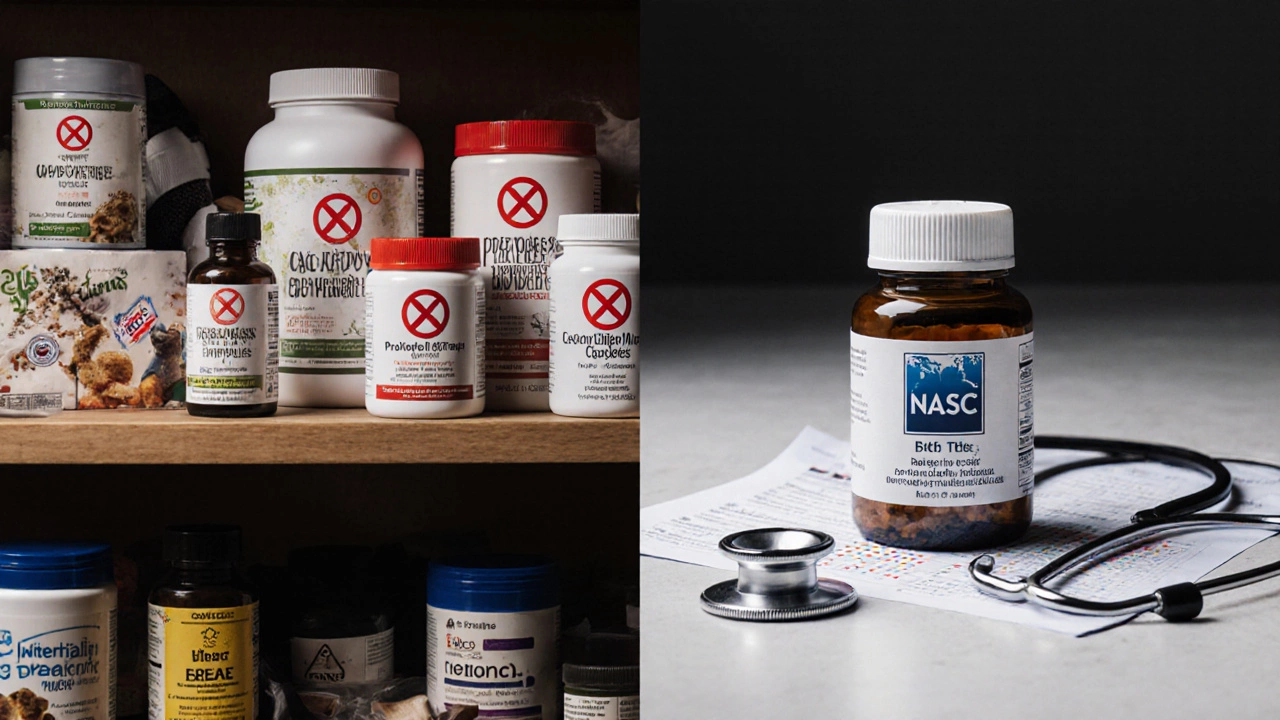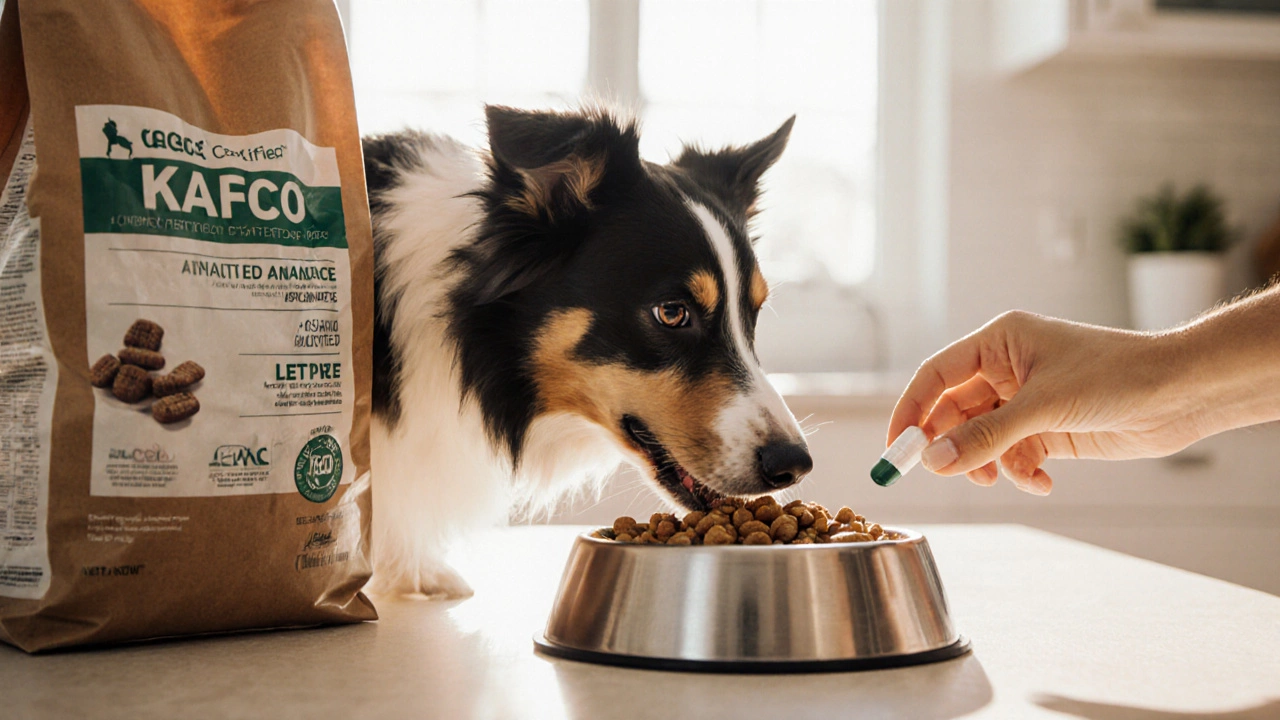Most dog owners want the best for their pets. When you see a shelf full of dog supplements-joint pills, omega-3 gummies, probiotic powders, even CBD chews-it’s easy to wonder: Do dogs really need supplements? The answer isn’t yes or no. It’s more like: it depends.
Most Healthy Dogs Don’t Need Supplements
If your dog is eating a complete and balanced commercial dog food-something labeled as ‘complete and balanced’ by AAFCO or similar standards-they’re already getting all the vitamins and minerals they need. The idea that dogs need extra nutrients because their food isn’t enough comes from marketing, not science. A 2023 study from the University of Edinburgh reviewed over 500 dog diets and found that 92% of dogs on commercial kibble or canned food met or exceeded their daily nutrient requirements without supplements.
Think of it like this: you wouldn’t give your kid a daily multivitamin just because it’s on sale at the supermarket. Same goes for dogs. Their bodies aren’t designed to need extra doses of things they already get in their food. In fact, too much of certain vitamins-like vitamin D or calcium-can cause serious health problems, including bone deformities or kidney damage.
When Supplements Actually Help
There are real cases where supplements make a difference. But they’re not for every dog. They’re for dogs with specific needs.
Senior dogs with arthritis often benefit from glucosamine and chondroitin. These aren’t magic cures, but they can slow cartilage breakdown and reduce stiffness. A 2022 clinical trial at the Royal Veterinary College showed dogs with moderate osteoarthritis moved more freely after 8 weeks on a joint supplement compared to those on placebo.
Dogs with digestive issues-like chronic diarrhea or gas-may respond well to probiotics. Not all probiotics are equal, though. Look for strains like Enterococcus faecium or Lactobacillus acidophilus that have been tested in dogs. A study in the Journal of Veterinary Internal Medicine found that dogs with recurrent GI upset had fewer flare-ups after 6 weeks on a vet-approved probiotic.
Dogs with skin or coat problems might need omega-3 fatty acids. Fish oil, especially from wild-caught salmon, can reduce itching and improve fur shine. One owner in Bristol noticed her Border Collie’s flaky skin cleared up after switching to a fish oil supplement-after ruling out fleas and food allergies first.
Dogs on homemade diets need supplements. If you’re cooking for your dog, you’re likely missing key nutrients like calcium, taurine, or zinc. A homemade diet without proper balancing can lead to bone disease or heart issues. Always work with a veterinary nutritionist before feeding homemade food.
What Supplements to Avoid
Not all supplements are safe. Some are outright dangerous.
Human multivitamins are a big no. They often contain xylitol, iron, or vitamin D in doses that can be toxic to dogs. Even a single tablet can cause poisoning.
Green-lipped mussel supplements sound natural, but they’re not regulated. Some brands contain heavy metals or contaminants. Stick to products tested by third parties like NSF International or the National Animal Supplement Council (NASC).
CBD oil is popular, but it’s still legally murky. The FDA hasn’t approved it for dogs. Some products contain THC, which is toxic. Others have no CBD at all. If you’re considering it, talk to your vet first-and only use vet-recommended brands with a certificate of analysis.

How to Choose a Safe Supplement
If you decide your dog needs one, here’s how to pick wisely:
- Look for the NASC seal. It means the product has been tested for quality and safety.
- Check the active ingredients. Avoid products with filler ingredients like corn syrup or artificial colors.
- Read the dosage. It should be based on your dog’s weight. If it’s not listed clearly, skip it.
- Ask your vet. They know your dog’s history and can recommend brands they trust.
- Start low. Give a half-dose for a week to watch for reactions like vomiting or diarrhea.
Brands like VetriScience, Nutramax, and Zesty Paws have been around for years and are commonly recommended by UK vets. Don’t be swayed by flashy packaging or Instagram influencers. Dog health isn’t a trend.
Supplements Aren’t a Substitute for Vet Care
Too many owners use supplements to avoid a vet visit. That’s risky. If your dog is limping, shedding heavily, or losing weight, a supplement won’t fix the root cause. These could be signs of thyroid disease, cancer, or organ failure.
One owner in Bristol gave her 10-year-old Labrador joint supplements for months because he was slow to rise. It wasn’t arthritis-it was early kidney failure. The supplements did nothing. The vet’s blood test revealed the real problem. Early detection saved her dog’s life.
Supplements can support health. But they can’t replace diagnosis, treatment, or proper nutrition.

What About Natural Foods?
Some people think feeding blueberries, pumpkin, or turmeric is the same as giving supplements. It’s not. A handful of blueberries won’t give your dog enough antioxidants to make a difference. A teaspoon of turmeric won’t reduce inflammation without a carrier like black pepper and a specific dose.
Whole foods are great as occasional treats. But they’re not replacements for formulated supplements when a medical need exists. If you want to add food-based nutrition, talk to your vet about safe amounts. Too much pumpkin can cause diarrhea. Too much turmeric can interfere with medications.
Bottom Line: Supplements Are Tools, Not Necessities
Most healthy dogs don’t need supplements. Their food already gives them what they need. But for dogs with specific health issues-arthritis, poor digestion, skin problems, or those on homemade diets-supplements can be helpful. The key is using them correctly: under vet guidance, with quality products, and only when there’s a clear reason.
Don’t buy supplements because they’re trendy. Don’t give them because your friend’s dog takes them. Ask yourself: Is this helping my dog’s actual health? Or is it just making me feel better?
When in doubt, skip it. A healthy diet, regular vet checkups, and daily walks do more for your dog’s long-term health than any pill or powder ever could.
Do all dogs need supplements?
No, most healthy dogs on balanced commercial food don’t need supplements. Their diet already provides all necessary nutrients. Supplements are only needed for specific health conditions or if the dog is on a homemade diet.
Can dog supplements be harmful?
Yes. Human supplements, especially those with xylitol, vitamin D, or iron, can be toxic. Overdosing on calcium or vitamin A can cause bone or liver damage. Poor-quality products may contain contaminants. Always choose vet-recommended brands with third-party testing.
What’s the best supplement for older dogs with stiff joints?
Glucosamine and chondroitin are the most researched options for senior dogs with arthritis. Omega-3 fatty acids from fish oil can also help reduce inflammation. A 2022 UK study showed dogs on these supplements moved more freely after 8 weeks. Always pick a product with the NASC seal.
Can I give my dog human probiotics?
Not safely. Human probiotics contain strains that may not survive in a dog’s gut. Some even contain xylitol or other ingredients toxic to dogs. Use only probiotics made specifically for dogs, like those with Enterococcus faecium or Lactobacillus acidophilus strains tested for canines.
Should I give my dog supplements if they eat homemade food?
Yes, absolutely. Homemade diets almost always lack key nutrients like calcium, taurine, zinc, and vitamin D. Without proper supplementation, dogs can develop serious conditions like rickets or dilated cardiomyopathy. Always consult a veterinary nutritionist before feeding homemade meals.
Are CBD supplements safe for dogs?
CBD is not FDA-approved for dogs, and many products contain THC or no CBD at all. Some can be dangerous. If you’re considering it, talk to your vet first. Only use vet-recommended brands with a certificate of analysis showing exact CBD and THC levels.
How do I know if a supplement is high quality?
Look for the NASC seal, which means the product has passed independent testing. Check for clear dosing instructions based on weight, real ingredients (no fillers like corn syrup), and a company that provides a certificate of analysis. Avoid products with vague claims like ‘boosts immunity’ without science behind them.






